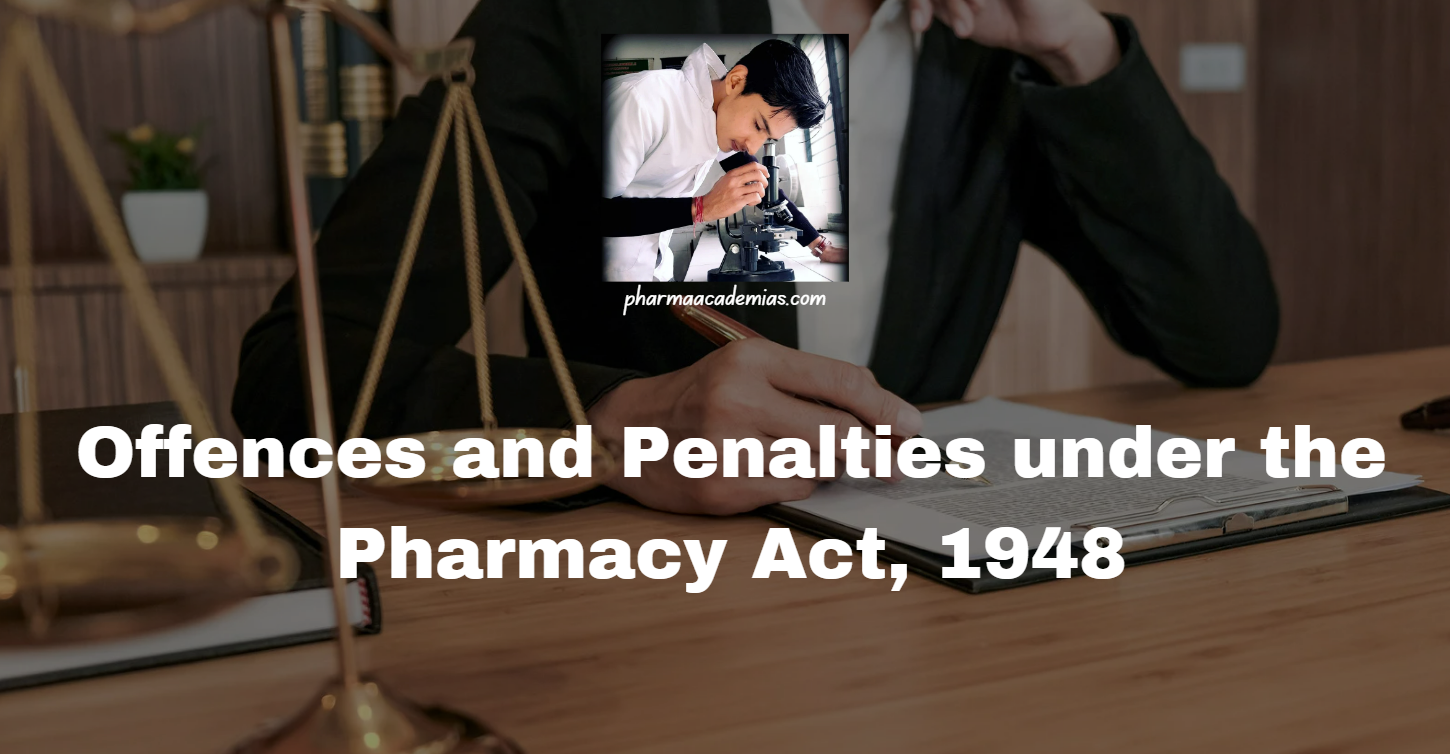The Pharmacy Act, 1948, lays down specific offences and penalties to ensure that the standards of pharmacy practice are maintained and that the public is protected from unqualified or unethical practitioners. These provisions are designed to deter illegal activities and maintain the integrity of the profession.
Key Offences
1. Practicing Without Registration:
– Any person who practices as a pharmacist without being registered under the Pharmacy Act, 1948, is committing an offence.
– This includes anyone who claims to be a pharmacist or undertakes any tasks that require the knowledge and skills of a pharmacist without proper registration.
2. False Representation:
– It is an offence to falsely represent oneself as a registered pharmacist.
– This includes using titles or qualifications that one is not entitled to, or providing misleading information about one’s registration status.
3. Fraudulent Use of Certificate:
– The fraudulent use of a registration certificate, such as using someone else’s certificate or providing false information to obtain a certificate, is an offence.
– This also covers cases where a person continues to use a registration certificate that has been revoked or suspended.
4. Failure to Surrender Certificate:
– If a pharmacist’s registration is suspended or revoked, they are required to surrender their registration certificate to the State Pharmacy Council.
– Failure to do so is considered an offence.
5. Violation of Professional Conduct:
– Pharmacists are expected to adhere to ethical standards and professional conduct as prescribed by the Pharmacy Council of India (PCI).
– Engaging in unethical practices, such as dispensing drugs without a prescription, substituting prescribed medications without authorization, or engaging in fraudulent activities, constitutes an offence.
6. Operating a Pharmacy Without a Registered Pharmacist:
– It is mandatory for every pharmacy to have a registered pharmacist present during its hours of operation.
– Operating a pharmacy without the presence of a registered pharmacist is an offence.
Penalties for Offences
1. Fines:
– The Pharmacy Act prescribes fines as penalties for various offences.
– The amount of the fine may vary depending on the nature and severity of the offence, as well as the specific provisions under which the offence falls.
2. Imprisonment:
– In certain cases, offences under the Pharmacy Act can result in imprisonment.
– The duration of imprisonment depends on the specific offence and can range from a few months to several years.
3. Cancellation or Suspension of Registration:
– A pharmacist found guilty of an offence may face the cancellation or suspension of their registration.
– Suspension may be temporary, whereas cancellation is permanent, barring the individual from practicing as a pharmacist.
4. Forfeiture of Certificate:
– In cases involving fraudulent use of a registration certificate or other serious offences, the pharmacist’s registration certificate may be forfeited.
– This means that the certificate is taken away and rendered invalid.
5. Prohibition from Practicing:
– A pharmacist who has been found guilty of serious offences may be prohibited from practicing for a specified period or permanently.
– This prohibition may also apply to those who have repeatedly violated the ethical standards of the profession.
Enforcement and Authority
1. State Pharmacy Councils:
– The State Pharmacy Councils are primarily responsible for enforcing the provisions of the Pharmacy Act within their respective states.
– They have the authority to investigate complaints, conduct inquiries, and take disciplinary action against registered pharmacists.
2. Pharmacy Council of India (PCI):
– The PCI oversees the overall implementation of the Pharmacy Act across India and provides guidelines on ethical standards and professional conduct.
– The PCI can also intervene in cases of serious offences that may have national implications.
3. Courts of Law:
– Offences under the Pharmacy Act may be tried in a court of law, where the judiciary has the authority to impose penalties, including fines and imprisonment.
– In such cases, the courts also have the power to enforce the cancellation or suspension of registration.
Conclusion
The offences and penalties under the Pharmacy Act, 1948, are crucial for maintaining the integrity of the pharmacy profession. By enforcing strict penalties for practising without registration, fraudulent activities, and unethical practices, the Act ensures that only qualified and competent individuals provide pharmaceutical services. This legal framework protects public health, upholds professional standards, and deters individuals from engaging in illegal or unethical practices in the field of pharmacy.

